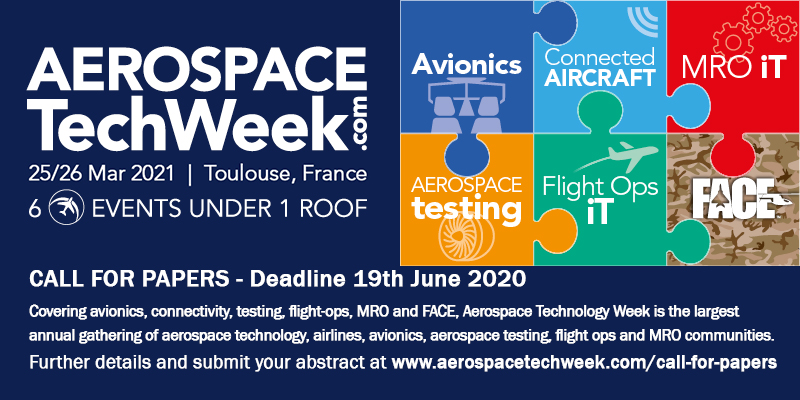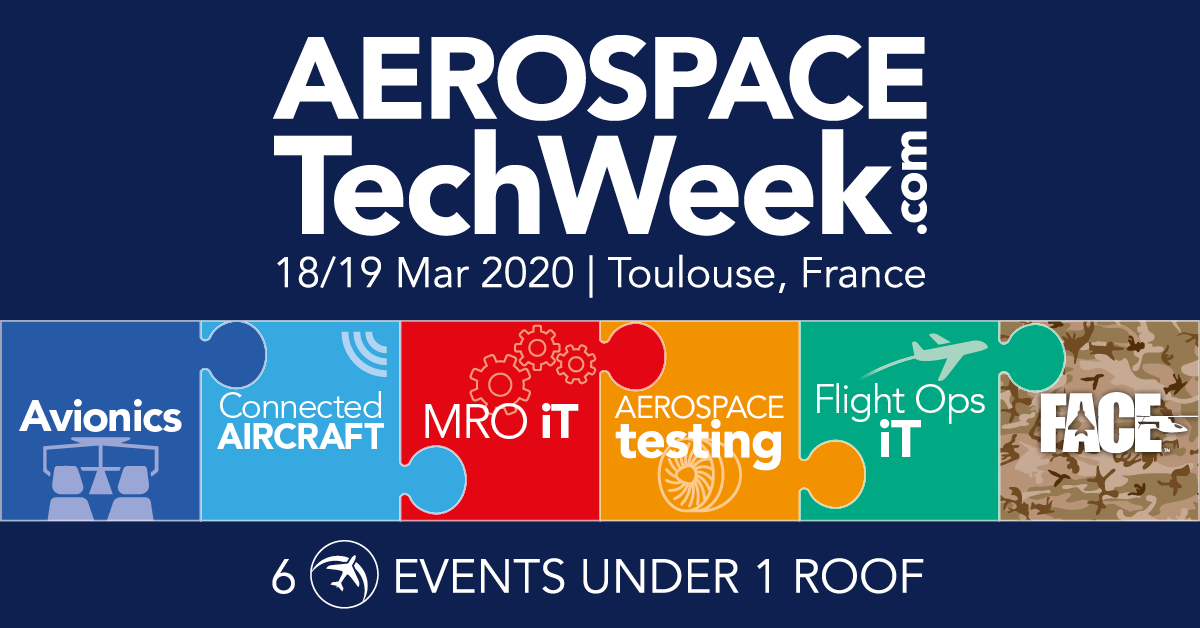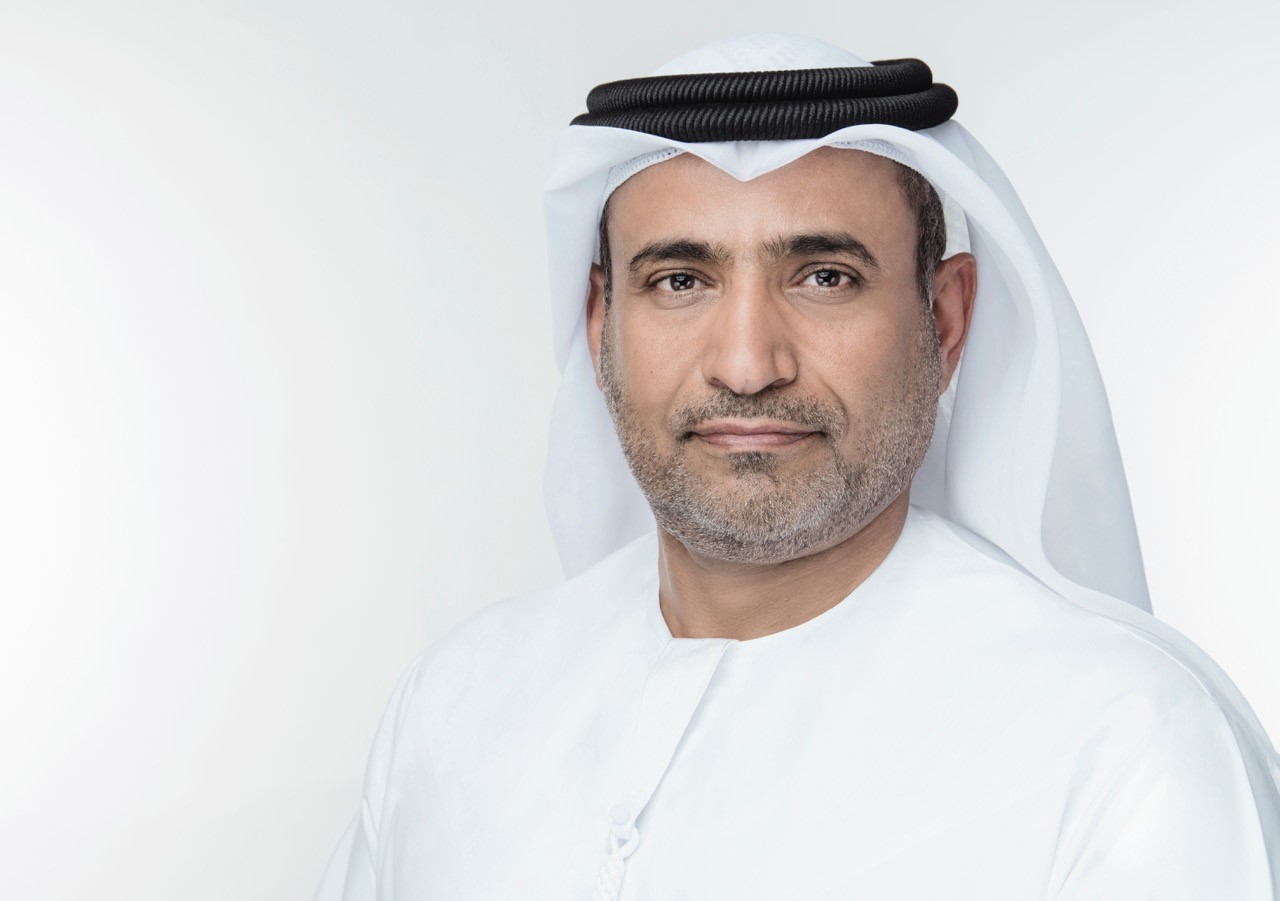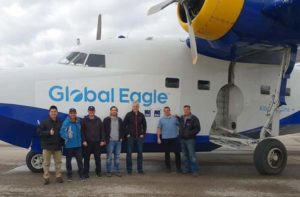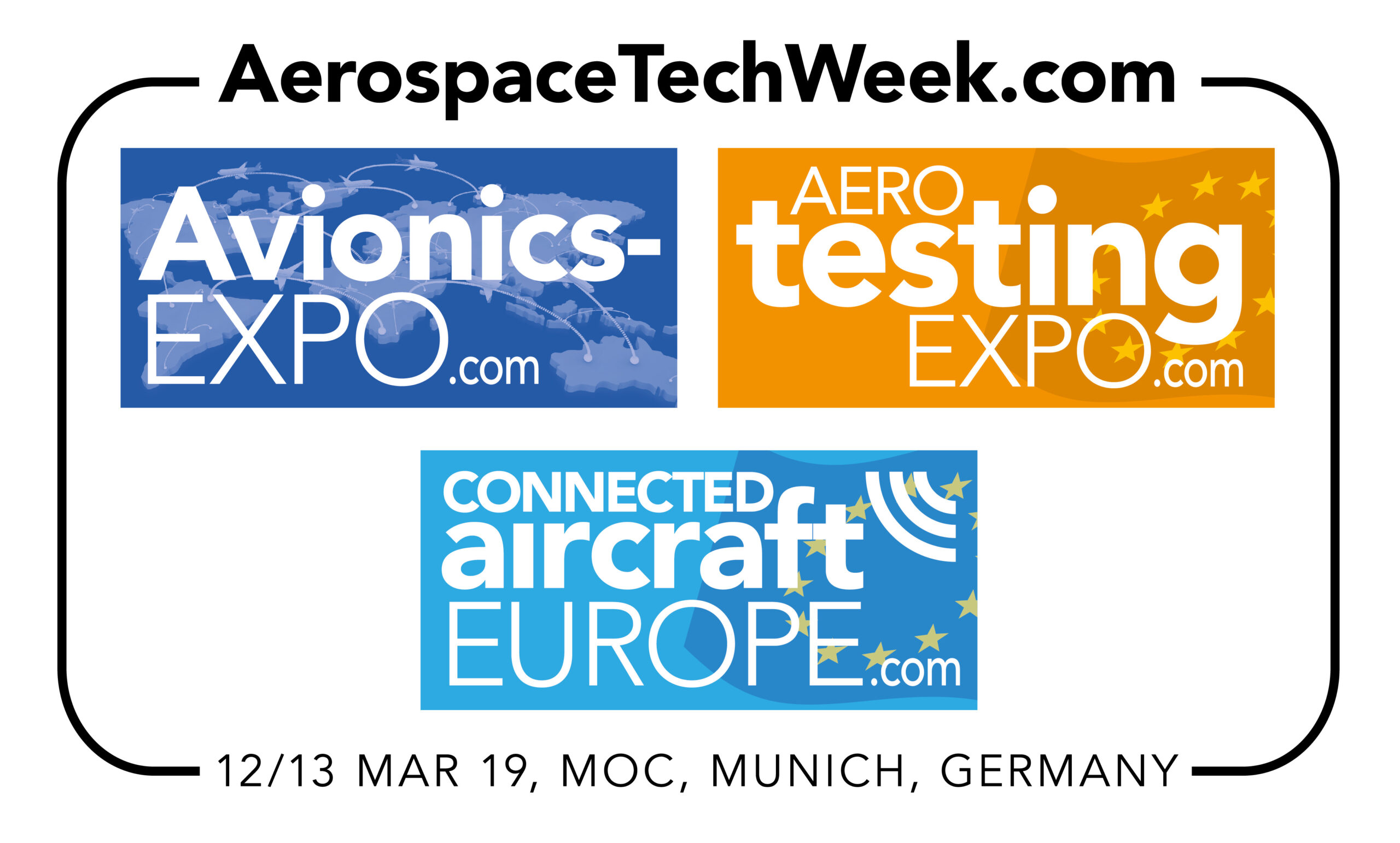Aerospace Technology Week has announced dates for next years event as 18th-19th March 2020 to take place at the Diagora Congress Center in Toulouse, France, and is set to be the largest gathering for the avionics, electronics, connectivity, aerospace testing and airline communities.
Aerospace Technology Week has developed greatly over the past two years and 2020 sees the introduction of 3 new areas of cous for the aerospace tech professional and now comprises of SIX complementary co-located Events:
(1) AVIONICS
(2) CONNECTED AIRCRAFT
(3) AEROSPACE TESTING
(4) FLIGHT OPS IT
(5) MRO IT
(6) FACE – Future Airborne Capability Environment
Each Event has a dedicated High Level Conference and there is a LARGE central Exhibition with sections for each and further details can be found at www.aerospacetechweek.com.
Each Event has a dedicated High Level Conference and there is a LARGE central Exhibition with sections for each and further details can be found at www.aerospacetechweek.com.
Avionics
Established for over 10 years, Avionics Expo is the leading exhibition and conference for both the commercial and defence sectors, fixed wing and rotorcraft.
Both SESAR and Next-Gen recognise the need to integrate the air and ground parts of their air traffic management systems by addressing efficiency needs of flight trajectories planning and execution and the seamless sharing of accurate information.
This framework provides a vehicle for the US and Europe to work together towards interoperable standards and in support of efforts towards achievement of ICAO global Harmonisation. For example, a significant achievement in the NextGen and SESAR collaboration is the delivery of an agreed-upon baseline NextGen/SESAR Joint Avionics Roadmap.
ICAO estimates that 120 billion US dollars will be spent on air transportation systems transformation in the next 10 years. While the NextGen and SESAR modernisation programmes account for a large share of this spending in Europe and the US, there are parallel investment initiatives in other regions.
Connected Aircraft
Launched in 2019, Connected Aircraft covers all the connectivity systems that airlines use (air-to-ground and nose-to-tail) including IFC, cabin IFEC, AI, M2M, VR, connected EFBs and ETLs, airline e-Enablement processes and strategies, ancillary revenues, IoT, big data analytics, flight tracking, cyber security, application disrupters, connectivity systems for operational efficiency and connectivity for predictive maintenance. The aviation industry is undergoing a technological transformation, as more aircraft are becoming “fully connected” machines in order to benefit the passenger experience, increase revenues for airlines and to improve safety, operations and maintenance – from the flight deck to the cabin.
Aerospace Testing
Launched in 2018, Aerospace Testing covers the hardware and software aspects of testing and certification related to the design, manufacture and maintenance of commercial and military aircraft (fixed-wing and rotary-wing), plus UAVs and space testing. Aerospace Testing is the key gathering for manufacturing and inspection professionals to learn about the latest regulations, challenges and technical developments for testing systems and products related to: Flight testing, Environmental testing, Climatic testing, Shock and Vibration testing, Structural testing, Avionics testing, Instrumentation testing, Fatigue testing, Test automation, MIMO testing, Wind tunnel testing, Measurement solutions, Pressure measurement, Lightning testing, Gap measurement, Air data testing, Non-destructive (NDT), Engine testing, Materials testing and Dynamics measurement.
Flight Ops IT
Launching in 2020, Flight Ops IT will cover all the software systems that airlines use for flight planning, aircraft scheduling, performance calculations, weight and balance, operations control, ground operations management, pilot training, paperless manuals, weather data, ACARS data management, crew management, EFBs and ETLs, big data analytics, e-signature, engine failure procedures, cyber security, environmental impact and noise reduction, fuel efficiency savings and CO2 emissions tracking for EU-ETS.
MRO IT
Launching in 2020, MRO IT will cover all the maintenance software systems that airlines use for legacy systems integration, digital transformation, job cards and MRO records, parts tracking and inventory management, payroll, procurement, training, supply chain logistics, fleet management, MRO scheduling and planning, blockchain, mobile maintenance Apps, voice-activated tooling, VR devices, predictive maintenance, forecasting, work orders, systems optimization, component and document tracking, reliability, planning, tech logs, maintenance control and anything else to do with aircraft fleet maintenance.
Aerospace Technology Week
Aerospace Tech Week is the annual gathering of the world’s leading aerospace companies to discuss and develop the systems and solutions to meet the needs of the evolving commercial aviation and aerospace defence industries. The show brings you the latest developments in aircraft connectivity (air-to-ground and nose-to-tail), airline e-Enablement, flight operations software, fuel efficiency, MRO software, regulatory, policy, technical SES and next-generation challenges for avionics, plus the testing systems that affect the design, construction and maintenance of all commercial and military aircraft (both hardware and software).
Bringing together the best aspects for aerospace technology, Aerospace Technology Week, comprising of Avionics, Connected Aircraft, Aerospace Testing, Flight Ops IT, MRO IT and Future Airborne Capability Environment delivers greater connectivity between these exciting, fast moving aerospace industry sectors.
CALL FOR PAPERS – deadline 21st June 2019
The conference committees for Avionics, Connected Aircraft, Aerospace Testing, Flight Ops IT and MRO IT are inviting abstracts for consideration for inclusion in the conference programme.
Representatives from airlines, airframers, prime contractors/integrators and the industry supply chain can benefit from sharing knowledge and experiences, to enhance the industry developments and solutions.
Abstracts can be submitted at www.aerospacetechweek.com/cfp. Deadline for abstracts is 21st June 2019.
Single European Sky and NextGen continue to dominate the aerospace industry, with targets of ensuring the utilisation of technology to increase traffic, improve aircraft and control communications whilst enhancing safety in an ever increasingly busy sky.
Passengers are demanding more from the aircraft in which they fly – 61% of passengers see high-quality inflight Wi-Fi availability as more important to them than onboard entertainment.
Airlines are wanting to see greater efficiencies whilst enhancing safety.
Adrian Broadbent, Event Director of Aerospace Technology Week, said, “There is much for the aerospace industry to discuss and develop in terms of safe and secure solutions for aircraft. Our increasing demand for air travel creates busier skies and higher expectations on aircraft to be online 24/7 means huge investments in greater connectivity. This in turn leads to increased security risks for aircraft and its passengers devices from being permanently online.”
“Aerospace Technology Week will look at these challenges across commercial, military and space crafts to understand the issues and challenges, from a regulatory perspective through to implementation and technology solutions, through the different elements of the programme – avionics, connect aircraft and testing or hardware and software applications. Aerospace Technology Week delivers an exciting programme for the global industry to explore and question the experts,” concluded Mr Broadbent.
For further information on Aerospace Technology Week visit www.AerospaceTechWeek.com.


